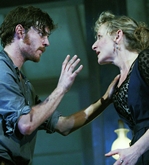SITE GUIDE
SEARCH
REVIEWS
REVIEW ARCHIVES
ADVERTISING AT CURTAINUP
FEATURES
NEWS
Etcetera and
Short Term Listings
LISTINGS
Broadway
Off-Broadway
NYC Restaurants
BOOKS and CDs
OTHER PLACES
Berkshires
London
California
New Jersey
DC
Connecticut
Philadelphia
Elsewhere
QUOTES
TKTS
PLAYWRIGHTS' ALBUMS
LETTERS TO EDITOR
FILM
LINKS
MISCELLANEOUS
Free Updates
Masthead
Writing for Us
A CurtainUp  London Review
London Review
 London Review
London ReviewGhosts
|
I say you are a child Manders. You have always been a little child. — Helene Alving
|

Harry Treadaway as Oswald and Lesley Sharp as Mrs Alving (John Haynes) |
Into London's smallest true West End theatre, The Duchess (unless you count The Arts) comes Irish playwright Frank McGuinness' new version of the Scandinavian classic. Interestingly, experienced starring actor Iain Glen is making his directorial debut and playing the gullible prig, Parson Manders. The wonderfully idiosyncratic Lesley Sharp is the troubled widow Mrs Alving and Malcolm Storry, veteran of many RSC and other productions, plays the exploitative rascal, Engstrand. Rounding off the cast are Harry Treadaway making only his second stage appearance, as Mrs Alving's son Oswald and Jessica Raine, previously seen in Punk Rock and Harper Regan, as the aspirational maid Regine.
I wonder whether Iain Glen has been too ambitious directing himself in a major part for his first venture into directing? The other curiosity is Glen's accent which wavers from Scottish to Northern Irish and back again. Maybe writer McGuinness saw the priest as one of the Calvinist preachers of Northern Ireland? Then there is the excess of Glen's performance as Manders. Ponderous and stuffy, there is no question of any romantic attachment between him and Mrs Alving, as has been implied in some other interpretations. Insensitively he tells Mrs Alving that she gave her child away to strangers when we know that all she was trying to achieve was for the son not to be corrupted by the father or bored by provincial life. This acting interpretation skews the play and it becomes less about Mrs Alving and her tragedy of the ghosts she lives with than about the living pomposity of the ridiculous Manders as he condemns her reading matter as "filth" and Oswald's life in Paris similarly.
There is still pain in the self accusation that Oswald reveals to his mother when he thinks that the reason for his illness might have been his own dissolute lifestyle in Paris. There is a nice performance as Regine from Jessica Raine who is not putting a foot wrong in her early acting career. It is almost as if she is the opportunist Engstrand's "true" child when she ditches the idea of a life with Oswald if it means nursing an invalid.
Lesley Sharp as the mother doesn't show horror until Oswald's degeneration in the final act when she screams and writhes on the floor to excess. She seems very young to me to have lived through the depressing excesses of her husband although her obvious anticipation of Oswald's arrival shows the obsessive nature of her hope for the future through her son. Harry Treadaway cannot be expected to save this play which has become more Victorian melodrama than true tragedy.
I liked the look of Stephen Brimson Lewis' light uncluttered set although the style clashes with Parson Manders' Disraeli type chin beard and black frock coat and the general concept of Victorian clutter at that time. There is a wooden model of the planned orphanage building on show in the Alvings' parlour.
I am afraid that the only atmospheric ghosts of this production are in the uncomfortable ghosts of past and perfectly resonating productions.
|
Subscribe to our FREE email updates with a note from editor Elyse Sommer about additions to the website -- with main page hot links to the latest features posted at our numerous locations. To subscribe,
E-mail: esommer@curtainup.comesommer@curtainup.com
put SUBSCRIBE CURTAINUP EMAIL UPDATE in the subject line and your full name and email address in the body of the message -- if you can spare a minute, tell us how you came to CurtainUp and from what part of the country. |
| Ghosts
Written by Henrik Ibsen In a new version by Frank McGuinness Directed by Iain Glen Starring: Iain Glen, Malcom Storry, Lesley Sharp, Harry Treadaway, Jessica Raine Design: Stephen Brimson Lewis Lighting: Oliver Fenwick Sound and Music: Richard Hammarton Running time: Two hours 05 minutes with one interval Box Office: 0844 579 1973 Booking to 15th May 2010 Reviewed by Lizzie Loveridge based on 23rd February 2010 performance at the Duchess Theatre, Catherine Street, London WC2B 5LA (Tube: Covent Garden) |
|
REVIEW FEEDBACK Highlight one of the responses below and click "copy" or"CTRL+C"
Paste the highlighted text into the subject line (CTRL+ V): Feel free to add detailed comments in the body of the email . . . also the names and emails of any friends to whom you'd like us to forward a copy of this review. |
|
London Theatre Tickets Lion King Tickets Billy Elliot Tickets Mighty Boosh Tickets Mamma Mia Tickets We Will Rock You Tickets Theatre Tickets |




